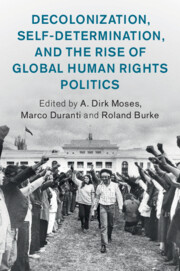Book contents
- Decolonization, Self-Determination, and the Rise of Global Human Rights Politics
- Human Rights in History
- Decolonization, Self-Determination, and the Rise of Global Human Rights Politics
- Copyright page
- Contents
- Notes on Contributors
- Acknowledgments
- Introduction
- Part I Anti-Colonial Struggles and the Right to Self-Determination
- Part II Postcolonial Statehood and Global Human Rights Norms
- Part III Colonial and Neocolonial Responses
- 11 The Inventors of Human Rights in Africa
- 12 “A World Made Safe for Diversity”
- 13 Between Humanitarian Rights and Human Rights
- 14 The End of the Vietnam War and the Rise of Human Rights
- 15 Decolonizing the Geneva Conventions
- 16 Liberté sans Frontières, French Humanitarianism, and the Neoliberal Critique of Third Worldism
- Index
13 - Between Humanitarian Rights and Human Rights
René Cassin, Architect of Universality, Diplomat of French Empire
from Part III - Colonial and Neocolonial Responses
Published online by Cambridge University Press: 24 June 2020
- Decolonization, Self-Determination, and the Rise of Global Human Rights Politics
- Human Rights in History
- Decolonization, Self-Determination, and the Rise of Global Human Rights Politics
- Copyright page
- Contents
- Notes on Contributors
- Acknowledgments
- Introduction
- Part I Anti-Colonial Struggles and the Right to Self-Determination
- Part II Postcolonial Statehood and Global Human Rights Norms
- Part III Colonial and Neocolonial Responses
- 11 The Inventors of Human Rights in Africa
- 12 “A World Made Safe for Diversity”
- 13 Between Humanitarian Rights and Human Rights
- 14 The End of the Vietnam War and the Rise of Human Rights
- 15 Decolonizing the Geneva Conventions
- 16 Liberté sans Frontières, French Humanitarianism, and the Neoliberal Critique of Third Worldism
- Index
Summary
This contribution distinguishes between two forms of rights discourse in the writings and practice of René Cassin. The first position was that of an advocate of humanitarian rights, understood as falling within the laws of war. His work on behalf of disabled WWI veterans was the origin of this commitment. Overlapping with humanitarian rights were human rights, as adumbrated in the Universal Declaration of Human Rights he helped to draft and to persuade the UN to adopt in December 1948. Human rights set down a supranational standard against which all nations had to measure their actions in peacetime as well as in wartime. The problem was that when Cassin dealt with the Jewish population of Palestine, he saw their cause in terms of human rights, the right to form their own state, whereas when he approached the question of Palestinian rights, he framed them in terms of humanitarian rights. The same was true for Muslims in Algeria. He failed to speak out on human rights violations both in Israel and in Algeria during the ongoing Arab–Israeli conflict and during the Algerian War of Independence. His universalism fractured when it came to violent conflicts between Europeans and non-Europeans in decolonization after 1945.
- Type
- Chapter
- Information
- Publisher: Cambridge University PressPrint publication year: 2020



